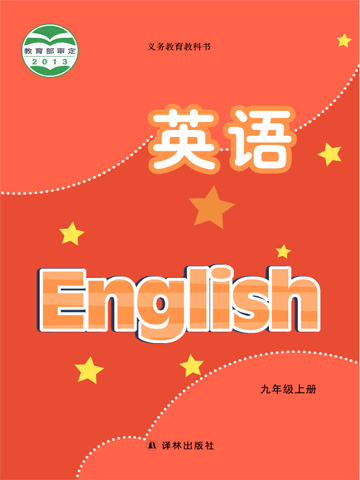
译林版(初中)九年级上册英语Unit 5 Art world课文音频
英语译林版(初中)九年级上册课文目录
Unit 5 Art world课文翻译及听力音频
Unit 5 Art world 翻译:第五单元 艺术世界
What are you doing, Eddie? 翻译:埃迪,你在干什么?
I'm painting. You know I love art. 翻译:我在画画。你知道我是喜欢艺术的。
You love art? 翻译:你喜欢艺术?
Yes. Art is something pleasant and ... 翻译:是啊,艺术能让人愉快,让人……
And what? Why do you stop there? 翻译:还让人什么?你为什么停下来了?
Because I've found something more pleasant than art. 翻译:因为我发现还有比艺术更让人愉快的事情。
Welcome to the unit 翻译:欢迎学习本单元
Art forms 翻译:艺术形式
B Millie and Daniel are talking about their favourite art forms. 翻译:B 米莉和丹尼尔正在谈论他们喜欢的艺术形式。
Work in pairs. Try to find out what art form your partner likes. 翻译:两人为一组,讨论对方喜欢哪种艺术。
Use the conversation below as a model. 翻译:请参考下列对话范例。
What art form do you like? 翻译:你喜欢哪种艺术形式?
I like music. 翻译:我喜欢音乐。
Really? What kind of music do you like best? 翻译:是吗?那你喜欢哪种音乐?
I prefer pop music. 翻译:我喜欢流行音乐。
Who's your favourite singer? 翻译:你喜欢哪个歌手?
I just love Michael Jackson! 翻译:我喜欢迈克·杰克逊。
Why do you love him? 翻译:你为什么会喜欢他?
Because he was the King of Pop. 翻译:因为他是流行音乐之王啊。
His musical talent was amazing. 翻译:他的音乐天赋太令人惊叹了。
Reading 翻译:阅读
A Tan Dun's music 翻译:A 谭盾的音乐
Sandy likes reading music magazines. 翻译:桑迪喜欢看音乐方面的杂志。
She is reading an article about the famous composer Tan Dun. 翻译:她在读一篇关于著名作曲家谭盾的文章。
Here is the article. 翻译:文章如下。
Music without boundaries 翻译:音乐无国界
Each time a medal was presented to a winner at the Beijing 2008 Olympic Games, the award music was played. 翻译:在北京2008年奥运会上,每当奖牌颁发给比赛胜利者时,颁奖音乐随即就会响起。
The music was written by Tan Dun, a world-famous composter. 翻译:这就是由谭盾作曲的。谭盾是一位世界著名的作曲家。
Born in 1958 in central Hunan, China, Tan Dun grew up near the Liuyang River. 翻译:谭盾,1958年出生于中国的湖南省。他在浏阳河畔长大。
When he was very young, Tan showed an interest in music. 翻译:在他很小的时候,谭盾就表现出对音乐的兴趣。
He loves the sounds of the rushing water and the blowing wind because, to him, the best music comes from nature. 翻译:他喜欢水流的声音,喜欢风吹的声音,对他来说,最好的音乐来自与大自然。
Since he had no musical instruments then, he made music with common objects like stones and paper. 翻译:由于那时候他并没有乐器,所以他只能将最普通的石头和纸张最为乐器。
In 1978, Tan entered the Central Conservatory of Music in Beijing. 1978 翻译:年,谭盾考上了北京的中央音乐学院。
Eight years later, he went on to study in the USA. 翻译:8年后,他去美国继续深造。
There he got to know great musicians from around the world. 翻译:在美国,他认识了来自世界各地的伟大音乐家。
As a composer, perhaps he is best known for winning an Oscar for his music in the film Crouching Tiger, Hidden Dragon. 翻译:作为一名作曲家,让他名声大噪的是他为电影《卧虎藏龙》制作的音乐获得了奥斯卡最佳音乐奖。
As he likes the sounds of nature, Tan uses them a lot in his music. 翻译:因为他喜欢来自大自然的声音,谭盾就在他的作品里大量使用这种自然之声。
His amazing piece of music Water does not use any musical instruments. 翻译:他在作品《水》没有使用任何乐器,这令人吃惊。
Instead, Tan makes over 50 sounds from water by controlling the speed of water flow. 翻译:通过控制水流的速度,谭盾从中获得了50多种声音。
They're the sounds of nature, and they create different pictures in different minds, Tan said. 翻译:“它们是自然的声音,这种声音在不同人的大脑里产生了不同的画面,”谭盾说。
Tan has helped build a bridge between the East and the West. 翻译:谭盾已经在东方音乐和西方音乐之间架起了一座桥梁。
He has successfully brought Chinese and Western music together. 翻译:他将中国音乐和西方音乐成功地融合在一起。
The music for the Beijing Olympics uses traditional Chinese music and the sounds of an ancient Chinese bell, though it is in a Western style. 翻译:在他为北京奥运会制作的音乐中,他使用了传统的中国音乐,以及中国古式大钟的声音,虽然它的形式采用的是西方音乐的形式。
My music is to dream without boundaries, Tan once said. 翻译:“我的音乐梦想是没有边界的。”谭盾曾经说道。
In his works, the past and the present, common objects and musical instruments, 翻译:在他的作品中,无论是以前的,还是现在的;无论是用石头演奏的,还是用乐器演奏的;
traditional Chinese music and modern Western music all mix together to make a new type-music without boundaries. 翻译:无论是中国古典音乐,还是西方现代音乐,他把这些元素都融合在一起,形成了新的音乐形式——没有国界的音乐。
Integrated skills 翻译:综合技能
A Different kinds of music 翻译:A 不同种类的音乐
A1 There will be a music show during the art festival. 翻译:A1 在艺术节期间会举办一场音乐会。
Listen to Mr Wu talking about the concerts for the show. 翻译:听吴老师对音乐会的节目安排。
Complete the poster with the correct date and times. 翻译:请将正确的日期和时间填写到海报中。
... 翻译:(听力练习)
A2 Sandy and Daniel are talking about the music show. 翻译:A2 桑迪和丹尼尔正在谈论音乐会。
Listen to their conversation and help Daniel match the music with its characteristics. 翻译:听对话,帮助丹尼尔将下列音乐的种类与其特征连起来。
... 翻译:(听力练习)
B Speak up: Would you like to go to a concert tonight? 翻译:B 人人讲英语:你今晚想去听音乐会吗?
Sandy is inviting her friend Janice to a concert. 翻译:桑迪正在邀请她的朋友珍妮丝去听音乐会。
Work in pairs. Take turns to invite your partner to a concert. 翻译:两人为一组,交替进行角色扮演,邀请对方去听音乐会。
Use the conversation below as a model. 翻译:可以参考下面的范例。
Would you like to go to a concert tonight, Janice? 翻译:珍妮丝,你今晚想去听音乐会吗?
Of course. What kind of concert is it? 翻译:想啊。是什么样的音乐会?
It's a classical music concert. 翻译:是一场古典音乐会。
Great! I love classical music. When does it start? 翻译:太棒了!我喜欢古典音乐。演出什么时候开始?
At 7 p.m. 翻译:晚上7点。
And where is it held? 翻译:演出的地点在哪儿?
At Sunshine Theatre. 翻译:在阳光剧院。
OK. Shall we meet at the gate of the theatre? 翻译:好的。我们在剧院的门口见吧。
All right. I'll see you there at 6:50. Bye. 翻译:好。我6点五十在那儿等你。再见。
Task 翻译:任务
The art form I like best 翻译:我最喜欢的艺术形式
B Read Sandy's story about how she became interested in painting. 翻译:B 阅读桑迪的故事,看她是如何对绘画感兴趣的。
All my teachers and classmates praised my designs for the art festival. 翻译:所有的老师和同学都称赞我为艺术节的设计。
They think I have a real gift for painting. 翻译:他们认为我天生擅长绘画。
However,I once did not like art lessons because I could not draw very well. 翻译:但是,我曾经一度讨厌艺术课,因为我画的不是很好。
One day, I was playing with some paint as usual in Ms Luo's art lesson. 翻译:有一天,在罗老师的绘画课上,我像往常一样在练习绘画。
I mixed the paint with water. 翻译:我把颜料加水搅拌均匀。
As I took the brush away, I dropped some paint onto the paper. 翻译:当我把刷子放下的时候,有些颜料洒在纸上了。
Looking at the mark, I decided to blow it. 翻译:看着这一块一块的颜料,我决定吹走它们。
The paint began to run, so I blew harder. 翻译:颜料开始动了,于是我吹得更猛了。
The paint ran in all directions and made a very interesting picture! 翻译:颜料在纸上向四面八方散开,竟然构成了一副有趣的图片。
I forgot that I was in class until Ms Luo came by my desk. 翻译:我忘记了我还在课堂上,直到罗老师走到我的桌前。
That's a very good picture, Sandy, said Ms Luo. 翻译:“桑迪,这真是一副美丽的图画。”罗老师说道。
She encouraged me to keep trying and make more wonderful pictures. 翻译:她鼓励我保持练习,创作更多有趣的图画。
I did make some wonderful pictures later. 翻译:之后,我确实创作了几幅不错的作品。
Since then, I have been crazy about crayons and paints. 翻译:从那以后,我疯狂的爱上了蜡笔和绘画。
I enjoy myself in the world of colours every time I paint. 翻译:每次我画画的时候,我都沉浸在五彩斑斓的世界里。
最新学习记录

